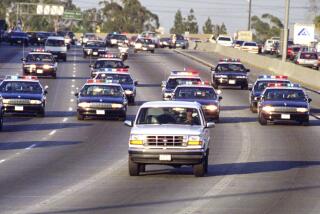Trial Showed U.S. Justice System at Its Best, Experts Say
- Share via
WASHINGTON — The last time the American people witnessed an emotional and highly publicized murder case, O.J. Simpson was on trial and the case became an indictment of the criminal justice system. Regardless of whether people agreed with the verdict, many believed that trial--with its circus atmosphere, bickering lawyers and vacillating judge--showed the system at its worst.
Monday, however, legal experts were widely praising of American justice as it unfolded during the Oklahoma City bombing trial. The prosecution was taut, the defense straightforward and the judge firm and steady.
“We should be able to look at jury verdicts and say, ‘These people speak for the community,’ ” said University of Chicago law professor Albert W. Alschuler. “We’ve had a harder time doing that in recent years. A lot of people had lost faith in the American justice system, not just with the Simpson verdict, but others [including] the first Rodney King verdict,” in which police officers who beat the fleeing Los Angeles motorist were acquitted.
What apparently worked for the federal government in its case against Timothy J. McVeigh was the successful combination of three key factors:
* Prosecutors deftly mixed the emotional appeals of victims with more technical forensic evidence, presenting a compelling case for jurors.
* U.S. District Judge Richard P. Matsch exerted a controlled, iron hand during the five-week trial, making decisive rulings on evidence and short-circuiting efforts to sidetrack the trial.
* McVeigh’s lawyers put up what many legal watchers characterized as a fairly weak defense, one that failed to undermine the testimony of witnesses who said McVeigh plotted the blast, rented the truck used in the bombing and then tried to run from authorities.
And unlike in the Simpson case, several legal analysts noted, there were no complicating factors, such as race, Hollywood or, for better or worse, cameras in the courtroom.
“Most verdicts are driven by the facts,” said Judy Clarke, a prominent defense attorney and president of the National Assn. of Criminal Defense Lawyers. “It is difficult for anyone to comment on whether it was a right or wrong verdict, unless the person was sitting in [jury] seats.”
The jurors will face another closely watched task: deciding whether McVeigh should be put to death by lethal injection for his crime.
“These jurors have already done probably one of the most difficult things they’ve ever had to do: sit in judgment of another human being, and in this century’s most emotional case. Now they must decide whether the defendant in this case lives or dies,” Clarke said.
To help the jury reach its verdict, the prosecution told a simple story about what happened on April 19, 1995, when a Ryder truck packed with explosives detonated in front of the Alfred P. Murrah Federal Building.
Led by Assistant U.S. Atty. Joseph Hartzler, the prosecution wove the technicalities of bomb-making and fingerprint analysis together with more compelling testimony about McVeigh’s alleged anti-government obsession and the human tragedy of so many killed and injured.
Unlike the Simpson trial, during which Los Angeles Superior Court Judge Lance A. Ito appeared tentative and weary from the buffeting he took daily from lawyers, Matsch demonstrated from the start he would be in control.
Matsch limited what the lawyers could say in public about the case and restricted the introduction of evidence. He prevented lead defense attorney Stephen Jones from offering evidence suggesting the bombing was tied to some greater terrorist conspiracy.
Matsch, 66, a Nixon appointee and 23-year veteran of the bench, started court every day at 9 a.m., recessed for lunch at the same time each day and tried to close at 5 p.m.
While the Simpson and bombing trials were handled differently, the defendants and victims in the two cases also were notably different.
“Without discounting the deaths of Nicole Brown and Ron Goldman, here you can say these victims are far more sympathetic,” “There were children in Oklahoma City, and the devastation cuts across lines of age, race, culture.”
Grimm also noted that while Simpson was known and even loved by a nation of sports fans, the unknown McVeigh was portrayed as an anti-government extremist guided by “The Turner Diaries,” a racist and anti-Semitic novel about a militia plot to bomb a federal building.
More to Read
Sign up for Essential California
The most important California stories and recommendations in your inbox every morning.
You may occasionally receive promotional content from the Los Angeles Times.













